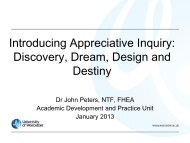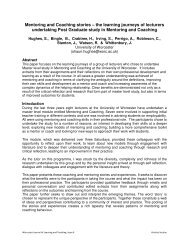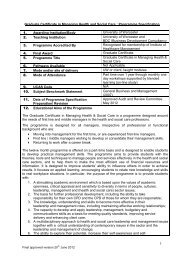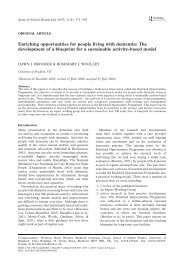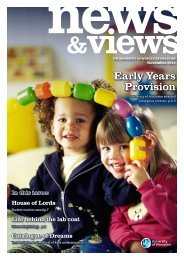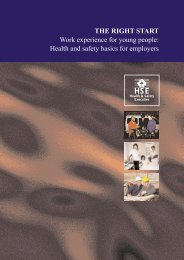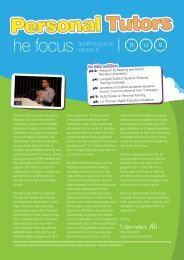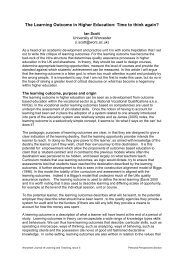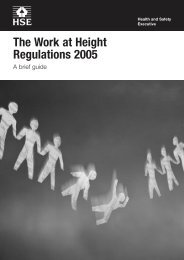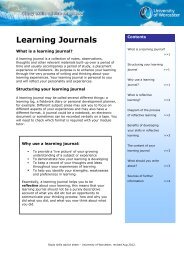Procedures for investigation of alleged cheating - University of ...
Procedures for investigation of alleged cheating - University of ...
Procedures for investigation of alleged cheating - University of ...
Create successful ePaper yourself
Turn your PDF publications into a flip-book with our unique Google optimized e-Paper software.
Academic Regulations and <strong>Procedures</strong>: <strong>Procedures</strong> <strong>for</strong> Investigations <strong>of</strong> Cases <strong>of</strong> Alleged CheatingPROCEDURES FOR INVESTIGATIONS OF CASES OF LEARNER INCOMPETENCE ANDALLEGED CHEATING1. General Statement <strong>of</strong> Principle1.1 Assessment, whatever <strong>for</strong>m it takes, is the means by which the <strong>University</strong> tests whethera student has achieved the objectives <strong>of</strong> a course and the standards <strong>of</strong> an award. It isfundamentally important that students are assessed fairly, and on equal terms witheach other <strong>for</strong> the same award. Cheating undermines the standards <strong>of</strong> the <strong>University</strong>’sawards and disadvantages those students who have attempted to complete theirassessments fairly and honestly. It is an <strong>of</strong>fence against the values <strong>of</strong> the academiccommunity <strong>of</strong> which students and staff are both part. Consequently <strong>cheating</strong> in all its<strong>for</strong>ms will not be tolerated. Staff will be vigilant in their attempts to prevent anddiscover <strong>cheating</strong>.1.2 This procedure is concerned with the actions <strong>of</strong> students and not their intentions. Anexcuse <strong>of</strong> “not intending to” is not an acceptable defence.1.3 In all cases <strong>of</strong> <strong>alleged</strong> learner incompetence and <strong>cheating</strong>, students will be treated asinnocent until a case against them has been investigated and upheld.1.4 Theses procedures are intended to ensure that there is consistency and fairness acrossthe <strong>University</strong> in the penalties applied to students who commit <strong>of</strong>fences <strong>of</strong> learnerincompetence or <strong>cheating</strong>.1.5 The student has the right to be accompanied by a representative, who is not acting in alegal capacity, at any meeting arranged to discuss the allegation. The representativemust be a member <strong>of</strong> the <strong>University</strong>, i.e.:a) a registered student;b) a member <strong>of</strong> staff;c) a member <strong>of</strong> staff or Sabbatical Officer <strong>of</strong> the Students Union.The role <strong>of</strong> the representative will be to support and advise the student and to helpthem to present their case1.6 These procedures:a) define different <strong>for</strong>ms <strong>of</strong> learner incompetence and <strong>cheating</strong>b) describe the procedures by which allegations <strong>of</strong> learner incompetence and<strong>cheating</strong> will be investigated and determinedc) set out the penalties <strong>for</strong> learner incompetence and <strong>cheating</strong>Page 1
Academic Regulations and <strong>Procedures</strong>: <strong>Procedures</strong> <strong>for</strong> Investigations <strong>of</strong> Cases <strong>of</strong> Alleged Cheating2. Definitions and Examples2.1 Suspected incidents <strong>of</strong> <strong>cheating</strong> will be defined as Minor (learner incompetence) orMajor depending on their seriousness, the level that the student is studying at and thecircumstances <strong>of</strong> the student. Incidents occurring in an examination will always betreated as Major and will be automatically be referred to the Cheating Committee.2.2 A student suspected <strong>of</strong> committing a Minor <strong>of</strong>fence will automatically be referred to theCheating Committee if s/he has previously had a case <strong>of</strong> <strong>cheating</strong> upheld, or issuspected <strong>of</strong> an <strong>of</strong>fence in more than one assessment item <strong>of</strong> his/her course.2.3 Learner Incompetence (minor <strong>of</strong>fence)Learner incompetence is a term used to describe instances where a student, hasproduced work which is either unduly derivative or which fails to recognise sources.Learner incompetence is not normally expected to occur after the student hascompleted the equivalent <strong>of</strong> the first year <strong>of</strong> a full time undergraduate course (whetherat the <strong>University</strong> <strong>of</strong> Worcester or another institution).2.4 Cheating (major <strong>of</strong>fence)Cheating means:a) A clear attempt to gain an unfair advantage in an assessmentb) Taking unauthorised materials into an examinationc) The falsification <strong>of</strong> data or in<strong>for</strong>mationd) Commissioning or seeking to commission the completion <strong>of</strong> assessment on theirbehalfe) Assisting another student to do any <strong>of</strong> the above2.5 Examples <strong>of</strong> learner incompetence or <strong>cheating</strong>2.5.1 PlagiarismThe presentation <strong>of</strong> the work <strong>of</strong> another as if it was one’s own independent work or anyimproper use <strong>of</strong> sources. For the purpose <strong>of</strong> these procedures, plagiarism includes:a) Word <strong>for</strong> word copying from sources (copy & paste)This is when a student copies a piece <strong>of</strong> text from the internet, an e journal,Word document, book or any other source and includes it in their assignmentwithout acknowledging the source.b) Word switchIf a student copies a sentence or paragraph into their assignment and changes afew words it will still be classed as plagiarism.Page 2
Academic Regulations and <strong>Procedures</strong>: <strong>Procedures</strong> <strong>for</strong> Investigations <strong>of</strong> Cases <strong>of</strong> Alleged Cheatingc) Reusing course contentThe reuse <strong>of</strong> work is where the author reuses identical or nearly identicalportions their own work without acknowledging what they are doing; as a resultthey do not let the reader know that this material has appeared elsewhere. Theessence <strong>of</strong> this practice is that the author is attempting to deceive the readerand it is there<strong>for</strong>e a <strong>for</strong>m <strong>of</strong> <strong>cheating</strong>d) Concealing sourcesIf a student cites a piece <strong>of</strong> work from a source more than once they mustreference it each time. No matter how many times they refer back to thesource they must acknowledge the source, even if it is in the very nextparagraph.e) Sham paraphrasingWhen someone copies text, word <strong>for</strong> word from a source, references the workbut does not place it in quotation marks so it appears to be paraphrased.f) Illicit paraphrasingWhen someone paraphrases text from a source but does not acknowledge thesource.g) Fake ReferencingTo make up quotations and/or supply fake citations. The fake citation can beeither completely fabricated or reference a real source (book, journal, or Website) which contains no such article or words that have supposedly been used orto imply that books and/or journals have been used by copying citations fromthe work <strong>of</strong> other authors when they have not.2.5.2 CollusionThis is when one student produces work and allows another student to copy it, bothstudents will be culpable. If both students submit the work, even at different times,both students will be deemed to have colluded.Collusion differs to group work - some coursework assessments will involve studentsworking together on a particular project. Such assessments may require studentssharing ideas, research and having a joint responsibility <strong>for</strong> the development <strong>of</strong> aproject. Some assignments may require students to work together and produce a jointpiece <strong>of</strong> work <strong>for</strong> assessment. Some assignments may require students to worktogether but then to produce an independent written piece <strong>of</strong> work.Page 3
Academic Regulations and <strong>Procedures</strong>: <strong>Procedures</strong> <strong>for</strong> Investigations <strong>of</strong> Cases <strong>of</strong> Alleged CheatingPeer review <strong>of</strong> each other’s work or discussing an assignment can be helpful; howeverstudents should be wary <strong>of</strong> falling into an act <strong>of</strong> collusion by actually producing/writingparts <strong>of</strong> an assignment <strong>for</strong> their peer/friend.2.5.3 Work presented is not written by the student, but originates from another sourceWhere a student commissions or seeks to commission another party (either paid orunpaid) to complete an assessment item on their behalf. Offences <strong>of</strong> this nature will bereferred to the Cheating Committee.2.5.4 Falsification <strong>of</strong> dataThe creation, fabrication or alteration <strong>of</strong> data or other in<strong>for</strong>mation – <strong>for</strong> example, bychanging data in order to confirm a hypothesis not supported by the actual data, or theinvention or fabrication <strong>of</strong> the results <strong>of</strong> experiment, which are then reported to prove apoint. Offences <strong>of</strong> this nature will be referred to the Cheating Committee.2.5.5 This list is not comprehensive and <strong>cheating</strong> may also take other <strong>for</strong>ms.2.5.6 Actions in relation to examinationsCheating in relation to examinations can include:a) Attempting to get sight <strong>of</strong> the examination paper be<strong>for</strong>e it is published;b) Taking unauthorised material or electronic device into an examination room;c) Copying or trying to copy the work <strong>of</strong> another student;d) asking another student <strong>for</strong> help during an examination;e) letting another student copy;f) impersonation.This list is not comprehensive and <strong>cheating</strong> may also take other <strong>for</strong>ms.2.6 DepartmentAn organisational name to describe a structure <strong>of</strong> the <strong>University</strong> such as Faculty,Department, Institute or School.2.7 Academic Integrity Tutors (AIT)Each Department will appoint academics (Academic Integrity Tutors) who has theresponsibility <strong>for</strong> dealing with all aspects <strong>of</strong> the <strong>investigation</strong> into cases <strong>of</strong> learnerincompetence and <strong>alleged</strong> <strong>cheating</strong>. This will include:a) Taking responsibility <strong>for</strong> <strong>investigation</strong> <strong>of</strong> the incident from the tutorb) Ensure the student is kept fully in<strong>for</strong>med about the <strong>investigation</strong>.c) Decide if the <strong>of</strong>fence is:• Learner incompetence (as defined above). If considered learnerincompetence the AIT will decide upon the appropriate penalty asPage 4
Academic Regulations and <strong>Procedures</strong>: <strong>Procedures</strong> <strong>for</strong> Investigations <strong>of</strong> Cases <strong>of</strong> Alleged Cheatingdescribed below;• A major <strong>of</strong>fence which should be referred to the Cheating Committee.d) Be a member <strong>of</strong> the Cheating Committee when requirede) Present a case against a student on behalf <strong>of</strong> the Departmentf) Ensuring decisions are recorded in the Student Record Systemg) Meet with other departmental AITs to ensure consistency <strong>of</strong> approach.h) Contribute to staff development.3. <strong>Procedures</strong> <strong>for</strong> the Academic Integrity Tutor (AIT)3.1 In coursework3.1.1 If a tutor suspects that a student has cheated, they will make a written report to theAcademic Integrity Tutor, providing evidence <strong>for</strong> their suspicion.3.1.2 The Academic Integrity Tutor will investigate further, and will ask the student to attenda meeting to discuss the matter. Meetings may take place in person or using audio orvideo conferencing.3.1.3 The student has the right to be accompanied by a representative, who is not acting in alegal capacity, at any meeting arranged to discuss the allegation. The representativemust be a member <strong>of</strong> the <strong>University</strong>, i.e.:a) a registered student;b) a member <strong>of</strong> staff;c) a member <strong>of</strong> staff or Sabbatical Officer <strong>of</strong> the Students Union.The role <strong>of</strong> the representative will be to support and advise the student and to helpthem to present their case3.1.4 The meeting may proceed in the absence <strong>of</strong> a student who has either indicated anintention to be present or has never responded to communications provided that theAcademic Integrity Tutor feels it has sufficient evidence available to consider the caseand that the student has been given sufficient notice <strong>of</strong> the meeting.3.1.5 In investigating a possible case <strong>of</strong> <strong>cheating</strong>, it is possible that an Academic IntegrityTutor will decide that:a) the case should be dismissed, orb) learner incompetence more accurately reflects the nature <strong>of</strong> the <strong>of</strong>fence, orc) the case should be referred to the Cheating Committee.3.1.6 In the case <strong>of</strong> learner incompetence, the Academic Integrity Tutor will apply the normalpenalty associated as identified below depending upon the category <strong>of</strong> incompetencetaking into account:a) Extent <strong>of</strong> incompetence demonstrated by the studentb) Learning background <strong>of</strong> the studentc) Conventions <strong>of</strong> the discipline or subject areaPage 5
Academic Regulations and <strong>Procedures</strong>: <strong>Procedures</strong> <strong>for</strong> Investigations <strong>of</strong> Cases <strong>of</strong> Alleged Cheating3.1.7 If it is found that the student has a previous record <strong>of</strong> either learner incompetence or<strong>cheating</strong> recorded on the student record system the case should be referred to theCheating Committee.3.1.8 In the case where the matter should be referred to the Cheating Committee and thestudent fully accepts that <strong>cheating</strong> has occurred, the student can choose to accept thenormal penalty as described in section 8.7.1 without the need <strong>for</strong> the case to be heardby the Cheating Committee. In such cases the Academic Integrity tutor will notify theComplaints and Appeals Officer who will seek written confirmation from theStudent. The Complaints and Appeals Officer will report the outcome to the Chair <strong>of</strong> theCheating Committee.3.1.9 In cases <strong>of</strong> learner incompetence, the Academic Integrity tutor will meet the studentand explain the nature <strong>of</strong> the incompetence and apply the appropriate penalty asindicated below.3.1.10 Students must be warned that repetition will result in a referral to the CheatingCommittee.3.2 Procedure and Penalties Associated with learner incompetencePlagiarism3.2.1 Word <strong>for</strong> word copying from sources (copy & paste) and word switch3.2.1.1 Procedure:If a member <strong>of</strong> staff suspects a student <strong>of</strong> word <strong>for</strong> word copying from sourcesand/or word switch the Academic staff should bring it to the attention <strong>of</strong> theAcademic Integrity Tutor (AIT). The AIT and the module tutor should interviewthe student.3.2.1.2 Penalties:a) If the quotes have been properly referenced then the work should bedowngraded <strong>for</strong> being unduly derivativeb) If the quotes have not been properly referenced, the student mustresubmit the assignment which will be capped at the minimum passmarkc) The decision will be noted on the student record systemPage 6
Academic Regulations and <strong>Procedures</strong>: <strong>Procedures</strong> <strong>for</strong> Investigations <strong>of</strong> Cases <strong>of</strong> Alleged Cheating3.2.2 Reusing Coursework:3.2.2.1 Procedure:If a member <strong>of</strong> staff suspects a student <strong>of</strong> reusing coursework the Academicstaff should bring it to the attention <strong>of</strong> the Academic Integrity Tutor (AIT). TheAIT and the module tutor should interview the student.The modules should be referred to the appropriate Departmental QualityCommittee <strong>for</strong> further <strong>investigation</strong>.3.2.2.2 Penalties:a) The student must resubmit the assignment which will be capped at theminimum pass mark.b) The decision will be noted on the student record system3.2.3 Concealing Sources / Sham paraphrasing / Illicit paraphrasing / Fake referencing3.2.3.1 Procedure:If a member <strong>of</strong> staff suspects a student <strong>of</strong> concealing sources and/or shamparaphrasing and/or Illicit paraphrasing the Academic staff should bring it to theattention <strong>of</strong> the Academic Integrity Tutor (AIT). The AIT and the module tutorshould interview the student.3.2.3.2 Penalties:3.2.4 Collusiona) The work will have been downgraded <strong>for</strong> inappropriate referencing.b) The student will have to see Academic Liaison librarian <strong>for</strong> In<strong>for</strong>mationLiteracy session. The Academic Liaison librarian will advise AIT <strong>of</strong>student’s attendance. Student allowed two months to complete thispenalty. Failure to attend will result in loss <strong>of</strong> credit <strong>for</strong> the module andthe student will be required to retake the module.c) The decision will be noted on the student record system3.2.4.1 Procedure:If a member <strong>of</strong> staff suspects a student <strong>of</strong> collusion the Academic staff shouldbring it to the attention <strong>of</strong> the Academic Integrity Tutor (AIT). The AIT and themodule tutor should interview the students and should check with ILS that thestudent has been on an In<strong>for</strong>mation Literacy course.3.2.4.2 Penalties:Page 7
Academic Regulations and <strong>Procedures</strong>: <strong>Procedures</strong> <strong>for</strong> Investigations <strong>of</strong> Cases <strong>of</strong> Alleged Cheatinga) If it is determined that the student who originally did the work was ignorant<strong>of</strong> the collusion s/he should not be penalised. If appropriate the decisionwill be noted on student record system.b) The student who copied the work should resubmit the assignmentwhich will be capped at the minimum pass mark.c) If students are found to be equally culpable they should both resubmitthe assignment which will be capped at the minimum pass markd) The decision will be noted on the student record system.3.2.5 Work presented is not written by the student, but originates from another source andfalsification <strong>of</strong> data3.2.5.1 Procedure:If a member <strong>of</strong> staff suspects a student <strong>of</strong> presenting work originating fromanother source or the student has falsified data the Academic staff should bringit to the attention <strong>of</strong> the Academic Integrity Tutor (AIT). The AIT and the moduletutor should interview the student.3.2.5.2 Penalties:a) The student should be referred to the Cheating Committee within threeworking days <strong>of</strong> the conclusion <strong>of</strong> the <strong>investigation</strong>.3.3 In examinations3.3.1 Procedure:If an invigilator suspects that a student is <strong>cheating</strong>, they will in<strong>for</strong>m the student <strong>of</strong> theirsuspicions, remove any unauthorised material, and clearly mark the examination scriptwith the time they spoke to the student. The student should be allowed to continuetheir examination. Within three working days <strong>of</strong> the examination, the invigilator willmake a written report to the Academic Integrity Tutor. The AIT and the module tutorshould interview the student.3.3.2 Penalties:a) The student should be referred to the Cheating Committee within three workingdays <strong>of</strong> the conclusion <strong>of</strong> the <strong>investigation</strong>.3.4 Referral to Cheating Committee3.4.1 If, after <strong>investigation</strong> the Academic Integrity Tutor finds that the student has a previousrecord <strong>of</strong> learner incompetence or <strong>cheating</strong> on the student record system or believesPage 8
Academic Regulations and <strong>Procedures</strong>: <strong>Procedures</strong> <strong>for</strong> Investigations <strong>of</strong> Cases <strong>of</strong> Alleged Cheatingthat the student has committed a major <strong>of</strong>fence the case should be referred to theCheating Committee within three working days <strong>of</strong> the conclusion <strong>of</strong> the <strong>investigation</strong>.3.4.2 The student will be sent a letter by the Complaints and Appeals Officer in<strong>for</strong>ming themthat an allegation <strong>of</strong> <strong>cheating</strong> has been made and asking them to attend a meeting <strong>of</strong>the Cheating Committee. The letter will include details <strong>of</strong> the specific allegations againstthe student.4. Research degree students4.1 If an examiner suspects that a student has cheated, they will make a report to the Head<strong>of</strong> Department, providing evidence <strong>for</strong> their suspicion.4.2 The Head <strong>of</strong> Department will investigate further and will ask the student to attend ameeting to discuss the matter.4.3 If, after <strong>investigation</strong> the Head <strong>of</strong> Department believes that there is sufficient evidencethat <strong>cheating</strong> has been committed, they will refer the case to the Cheating Sub-Committee <strong>of</strong> the Research Degrees Board within three working days <strong>of</strong> the conclusion<strong>of</strong> the <strong>investigation</strong>.4.4 The student will be sent a letter by the Secretary <strong>of</strong> the Research DegreesBoard asking them to attend a meeting <strong>of</strong> the Cheating Sub-Committee <strong>of</strong>RDB. The letter will include details <strong>of</strong> the specific allegations against thestudent.5. Cheating Committee5.1 The Cheating Committee is a sub-committee <strong>of</strong> the Representations Committee.5.2 In the case <strong>of</strong> research students, a sub-committee <strong>of</strong> the Research Degrees Board willhear and determine the matter.5.3 The student will be sent a letter by the Complaints and Appeals Officer in<strong>for</strong>ming themthat an allegation <strong>of</strong> <strong>cheating</strong> has been made and asking them to attend a meeting <strong>of</strong>the Cheating Committee. The letter will include details <strong>of</strong> the specific allegations againstthe student.5.4 Membership <strong>of</strong> the Committee will be:The Chair <strong>of</strong> the Representations Committee or nominee (Chair)2 members <strong>of</strong> academic staff5.5 No member <strong>of</strong> the Committee shall have been involved in the decision to refer thematter to the Committee or have prior knowledge <strong>of</strong> the case.Page 9
Academic Regulations and <strong>Procedures</strong>: <strong>Procedures</strong> <strong>for</strong> Investigations <strong>of</strong> Cases <strong>of</strong> Alleged Cheating5.6 The Academic Registrar, or his/her nominee, shall be Secretary to the Committee. TheSecretary is not a member <strong>of</strong> the Committee.6. Cheating Sub-Committee <strong>of</strong> Research Degree Board6.1 Membership <strong>of</strong> the Committee will be:The Chair <strong>of</strong> Research Degrees Board or nominee (Chair)2 other members <strong>of</strong> the Research Degrees Board6.2 No member <strong>of</strong> the Committee shall have been involved in the decision to refer thematter to the Committee or have prior knowledge <strong>of</strong> the case.6.3 The Secretary to the Research Degrees Board will be Secretary to the Sub-Committee.The Secretary is not a member <strong>of</strong> the Committee.7. Attendance <strong>of</strong> the Student at the Hearing7.1 The student will be notified the date and the time <strong>of</strong> the meeting at least five workingdays in advance <strong>of</strong> Committee meeting and all parties will receive copies <strong>of</strong> alldocuments which will be relied on at the hearing. The student may submit writtenevidence.7.2 The student has the right to be present at the meeting <strong>of</strong> the Committee. Meetings maytake place in person or using audio or video conferencing.7.3 The student and the staff representative may ask any member <strong>of</strong> staff or other studentto appear as a witness at the hearing. The Secretary <strong>of</strong> the Committee must be notifiedin advance <strong>of</strong> witnesses to be called; in complex cases, written statements <strong>of</strong> witnessesmay be submitted in advance.7.4 The student has the right to be accompanied by a representative, who is not acting in alegal capacity, at any meeting arranged to discuss the allegation. The representativemust be a member <strong>of</strong> the <strong>University</strong>, i.e.:a) a registered student;b) a member <strong>of</strong> staff;c) a member <strong>of</strong> staff or Sabbatical Officer <strong>of</strong> the Students Union.The role <strong>of</strong> the representative will be to support and advise the student and to helpthem to present their case7.5 The meeting may proceed in the absence <strong>of</strong> a student who has indicated an intention tobe present or has never responded to communications provided that the Committeefeels it has sufficient evidence available to consider the case and that the student hasbeen given sufficient notice <strong>of</strong> the meeting.Page 10
Academic Regulations and <strong>Procedures</strong>: <strong>Procedures</strong> <strong>for</strong> Investigations <strong>of</strong> Cases <strong>of</strong> Alleged Cheating7.6 The <strong>for</strong>mat <strong>of</strong> the meeting shall normally be as follows:a) Private meeting <strong>of</strong> the Committee.b) Student, and his or her representative, and the Department representative(normally the Academic Integrity Tutor) are invited to join the meeting.c) The Chair will summarise the procedure to be adopted and ask if there are anyprocedural questions.d) The facts relevant to the case will be introduced by the Chair.e) The Department representative will state the case against the studentf) The Committee may then question the Department representativeg) The student will be invited to make an initial statement on the case and begiven an opportunity to comment on the Department’s statement.h) The Committee may then question the Studenti) The Department representative will be given an opportunity to comment on theStudents statement.j) The student and his or her companion may then make a final statement.k) The student, his or her companion and the Department representative will thenbe asked to withdraw.l) Private meeting <strong>of</strong> the Committee.7.7 The Committee may call <strong>for</strong> any additional evidence in order to arrive at a decision andmay, in exceptional cases, ask another member <strong>of</strong> staff or another student to attend thehearing.7.8 Burden <strong>of</strong> pro<strong>of</strong>The Committee will work within the following principles in deciding whether or not<strong>cheating</strong> has taken place or has been intended:7.8.1 Members <strong>of</strong> the Committee must be secure in their belief that <strong>cheating</strong> hasoccurred based upon the evidence presented.7.8.2 Members <strong>of</strong> the Committee are only concerned with the the actions <strong>of</strong> studentsand not their intentions7.8.3 The consequences <strong>for</strong> the student <strong>of</strong> being found guilty <strong>of</strong> <strong>cheating</strong> should notbe a factor <strong>for</strong> the Committee in evaluating the evidence and making itsdecision.7.8.4 Every reasonable attempt should be made to ensure that the Committee has noprior knowledge about the student’s record on the course, whether this is to thestudent’s advantage or disadvantage, except where such in<strong>for</strong>mation has beenprovided by the student. This would include any <strong>for</strong>mer accusations orconfirmations <strong>of</strong> the student having cheated; their mark pr<strong>of</strong>ile, attendancerecord, etc.Page 11
Academic Regulations and <strong>Procedures</strong>: <strong>Procedures</strong> <strong>for</strong> Investigations <strong>of</strong> Cases <strong>of</strong> Alleged Cheating7.8.5 Students may make available to the Cheating Committee any in<strong>for</strong>mation abouttheir previous record on the course which they wish to draw to the attention <strong>of</strong>the Committee.7.9 Record <strong>of</strong> the meeting7.9.1 The <strong>for</strong>mal minute <strong>of</strong> the Committee shall record those present and in whatcapacity present, the nature <strong>of</strong> the allegation, the decision <strong>of</strong> the Committee,any penalty imposed and the rationale <strong>for</strong> the penalty.7.9.2 The minute shall be confidential except <strong>for</strong> the monitoring carried out, and theanonymity <strong>of</strong> those against whom the charge <strong>of</strong> <strong>cheating</strong> was not proven shall,so far as possible, be preserved.7.10 Notification <strong>of</strong> the Committee’s decision to the studentThe student will be in<strong>for</strong>med orally <strong>of</strong> the Committee’s decision on the day <strong>of</strong> themeeting; and will be sent written confirmation <strong>of</strong> the decision within 5 working daysafter the meeting.Notification to the student shall:7.10.1 State the facts found7.10.2 Identify the main issues and the conclusions to each <strong>of</strong> them7.10.3 Make clear the basis <strong>for</strong> the final decisionIn cases where an allegation is confirmed a copy <strong>of</strong> any decision taken will be noted onthe student record system7.11 Notification <strong>of</strong> the Committee’s decision to the Board <strong>of</strong> ExaminersWhen a student has been found guilty <strong>of</strong> <strong>cheating</strong>, the Secretary <strong>of</strong> the Committee shallnotify the Board <strong>of</strong> Examiners (or the Research Degrees Committee as appropriate) <strong>of</strong>the decision and <strong>of</strong> the penalty imposed.8. Penalties within the remit <strong>of</strong> the <strong>cheating</strong> committee8.1 There must be consistency and fairness across the <strong>University</strong> in the penalties agreed byCheating Committees.8.2 The penalty should reflect the seriousness <strong>of</strong> the <strong>cheating</strong> <strong>of</strong>fence.8.3 In determining the seriousness <strong>of</strong> the <strong>of</strong>fence, the Cheating Committee should take intoaccount the following factors:8.3.1 the scale and extent <strong>of</strong> the <strong>cheating</strong>8.3.2 Disciplinary conventions <strong>of</strong> the subject area8.3.3 any exceptional circumstances supported by relevant evidencePage 12
Academic Regulations and <strong>Procedures</strong>: <strong>Procedures</strong> <strong>for</strong> Investigations <strong>of</strong> Cases <strong>of</strong> Alleged Cheating8.3.4 previous <strong>of</strong>fences <strong>of</strong> <strong>cheating</strong>8.4 The record <strong>of</strong> the meeting should give the penalty, and the rationale <strong>for</strong> applying thatparticular penalty so that fairness and consistency can be ensured.8.5 Be<strong>for</strong>e deciding the penalty, the Committee will be in<strong>for</strong>med <strong>of</strong> any previous <strong>of</strong>fencesand any record <strong>of</strong> learner incompetence.8.6 In a few cases, the Cheating Committee will decide that learner incompetence moreaccurately reflects the nature <strong>of</strong> the <strong>of</strong>fence than <strong>cheating</strong>. In such cases, the CheatingCommittee will not pursue the allegation <strong>of</strong> <strong>cheating</strong> further but will apply the normalpenalty in cases <strong>of</strong> learner incompetence identified above.8.7 Where, after full examination <strong>of</strong> all evidence, a Cheating Committee has decided astudent has cheated they shall apply one <strong>of</strong> the penalties below. In cases where astudent continues to attempt to mislead the committee the committee may impose amore severe penalty.8.7.1 A mark <strong>of</strong> zero to be awarded <strong>for</strong> the module concerned. The student will failthe module and be required to re-take it. The student will also lose credit in aminimum <strong>of</strong> one additional module up to the value <strong>of</strong> the module in which<strong>cheating</strong> occurred. The penalty will normally be applied to the most recentlycompleted module(s). The mark(s) after re-assessment shall be capped at theminimum pass grade/mark. Compensation cannot be applied to thesemodules/credits.This will be the normal penalty <strong>for</strong> a first <strong>of</strong>fence.Where a student is subject to an externally imposed pr<strong>of</strong>essional code <strong>of</strong>conduct, action may be required under the code concerned. Where a student isfound to have cheated and is required as a result to attend <strong>for</strong> an additionalperiod(s) any bursary will be suspended <strong>for</strong> the period <strong>of</strong> additional attendance.8.7.2 A mark <strong>of</strong> zero to be awarded <strong>for</strong> the module(s) concerned. Compensationcannot be applied to the module(s). Re-assessment permitted; mark onreassessment capped at the minimum pass grade/mark.This penalty should be imposed where the Committee has accepted that thestudent has exceptional circumstances supported by relevant evidence or wherethe <strong>of</strong>fence is a minor one.8.7.3 The student will fail the module. The student will also lose credit in a minimum<strong>of</strong> one additional module up to the value <strong>of</strong> the module in which <strong>cheating</strong>occurred. No re-assessment permitted. Registration terminated and hencewithdrawal from the programme required.This penalty should be applied to a second or a very serious first <strong>of</strong>fenceincluding an <strong>of</strong>fence at postgraduate research level.Page 13
Academic Regulations and <strong>Procedures</strong>: <strong>Procedures</strong> <strong>for</strong> Investigations <strong>of</strong> Cases <strong>of</strong> Alleged Cheating9. <strong>Procedures</strong> <strong>for</strong> Appeal9.1 A student may appeal against the decision <strong>of</strong> an AIT, the Cheating Committee or Sub-Committee <strong>of</strong> RDB on the following grounds:9.1.1 that procedures have not been correctly followed9.1.2 that the penalty imposed is too severe having regard to the nature <strong>of</strong> the<strong>of</strong>fence and the guidance9.1.3 that there is significant new evidence which could not have been made availableto the Committee at the time <strong>of</strong> the hearing.9.2 Appeals against the decision <strong>of</strong> an AIT should be made in writing to the Chair <strong>of</strong> theCheating Committee with 10 working days <strong>of</strong> the written decision <strong>of</strong> the AIT.9.3 On receipt <strong>of</strong> an appeal, the Chair <strong>of</strong> the Cheating Committee shall decide if there areclear grounds, and shall either:9.3.1 refuse the appeal, or9.3.2 refer it to the Committee <strong>for</strong> consideration.9.4 Appeals against the decision <strong>of</strong> the Committee or against the Chair <strong>of</strong> the CheatingCommittee who decides to refuse an appeal should be made in writing within 10working days <strong>of</strong> receipt <strong>of</strong> the written decision to the Deputy Vice Chancellor. Appealsunder 9.1.3 are not time limited.9.5 On receipt <strong>of</strong> an appeal, Deputy Vice Chancellor (or nominee) shall decide if there areclear grounds, and shall either:9.5.1 refuse the appeal9.5.2 refer it back to the Committee <strong>for</strong> reconsideration, or9.5.3 constitute a new Committee.9.6 Where the decision <strong>of</strong> the Deputy Vice Chancellor or the Committee is to uphold theoriginal decision the letter to the student will draw attention to the individual’s right torefer the matter to the Office <strong>of</strong> the Independent Adjudicator.10. Annual Report to Representations Committee10.1 An annual report <strong>of</strong> <strong>investigation</strong>s <strong>of</strong> cases <strong>of</strong> <strong>alleged</strong> <strong>cheating</strong> and their outcomes willbe made to the Representations Committee.10.2 A report from the AIT should be included in the annual report <strong>of</strong> the relevantcourse/subject.Page 14
Academic Regulations and <strong>Procedures</strong>: <strong>Procedures</strong> <strong>for</strong> Investigations <strong>of</strong> Cases <strong>of</strong> Alleged Cheating11. Advice and Support11.1 If you have any queries in respect <strong>of</strong> this Procedure, please contact the Complaints andAppeals Officer or the Examinations and Assessment Officer, Registry Services.11.2 The <strong>University</strong> recognises that a student suspected <strong>of</strong> <strong>cheating</strong> can be stressful.Students are there<strong>for</strong>e advised to seek advice and guidance from the Students’ Union.Note: Where these <strong>Procedures</strong> state that certain actions will be taken within a specifiedtimescale and this is not possible (e.g. because <strong>of</strong> the timing or because key in<strong>for</strong>mation takeslonger to obtain, parties will be kept fully in<strong>for</strong>med <strong>of</strong> the progress <strong>of</strong> their case.Version reference: CH/2.3Date document was approved and comes into effect: 12 September 2010Author <strong>of</strong> the document: Kevin PickessDate document is due <strong>for</strong> review: 1 September 2016Revision HistoryCommittee Date ChangeAcademic Board 24 April 2013 Add revised text regarding student right to bev2.3accompanied at any meeting.Academic Boardv2.2Academic Boardv2.1Academic Boardv2.0Academic Boardv1.1Academic Board12 October 2011 Minor changes and revisions: Fake Referencingadded; meetings can take place other than inperson and an amendment to the standardpenalty.6 July 2011 Membership <strong>of</strong> the <strong>cheating</strong> committee changed toread ‘2 members <strong>of</strong> academic staff’ (5.4)7 July 2010 Significant amendments to the proceduresincluding a change away from seeking to determinethe intention <strong>of</strong> a student to the actions <strong>of</strong> astudent and the introduction <strong>of</strong> AITs to managepenalties associated with learner incompetence.26 April 2006 All cases <strong>of</strong> Learner Incompetence to be reportedthe Appeals and Complaints Officer added (3.4).New procedure ApprovedPage 15



